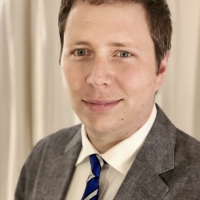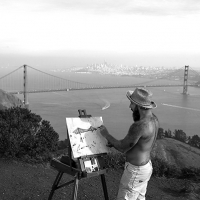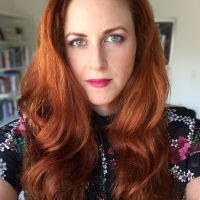GUH People: Alex Werth
Alex Werth is a researcher, cultural organizer, and DJ. In 2019, he received his PhD in Geography with a Designated Emphasis in Global Metropolitan Studies from UC Berkeley. His dissertation, entitled Racial Reverberations, looked at the longstanding role of popular music and dance in campaigns to empower, but also police and displace, working-class communities of color in Oakland. He currently serves as the Policy Associate at East Bay Housing Organizations (EBHO). He took the first Global Urban Humanities seminar course on The City, Arts & Public Space.
 How did you get involved with the Global Urban Humanities Initiative? Tell us a little bit about your GUH experience.
How did you get involved with the Global Urban Humanities Initiative? Tell us a little bit about your GUH experience.
I started graduate school in 2012. At the time, I was researching and organizing among the ad hoc group of artists, vendors, and activists that turned Oakland First Fridays into a large-scale street festival. I was looking for intellectual tools to make sense of these intersections of race, gentrification, and public culture in ways that neither simply celebrated nor condemned this new urban spectacle. So I was excited to learn that Shannon Jackson and Teresa Caldeira were piloting a GUH methods course that spanned urban and performance studies. A few years later, they invited me to serve as a GSI for the class. Those experiences were very formative for me. They ultimately equipped me to write my dissertation on the racial/spatial politics of music, dance, and public culture in Oakland in ways that remixed theories of the city from the humanities and social sciences alike.
You are working as a Policy Associate at EBHO. Can you tell us more about what you do and how your GUH experience has helped your job?
I work on policy development, advocacy, and coalition building to drive structural solutions to the housing and displacement crises in Alameda and Contra Costa Counties. At EBHO, our mission involves both policy work and organizing work, with a focus on residents of affordable housing. Increasingly, we're working to transcend the silos that exist between these two cultures and categories of practice in order to transform how we show up in the movement for housing justice. I think that my experience in GUH--and graduate school, more broadly--prepared me for this work by teaching me to inhabit the interstices between at times divided disciplines, perspectives, and theories of change.
What advice would you give to current GUH students who may be exploring future career prospects?
I'd look for ways to connect your research to people and projects beyond academia. While in graduate school, I curated public cultural events at Yerba Buena Center for the Arts, the Matatu Festival of Stories, and a party series called Good Culture. I also served as the research analyst for the City of Oakland's Cultural Plan, which, in 2018, sought to promote equitable investment and anti-displacement measures through arts and cultural policy. These endeavors expanded my horizons, practically and professionally. They kept me grounded in relations, aesthetics, and politics that complemented my studies. And, more instrumentally, they allowed me to build relationships with local activists, advocates, and organizations that proved invaluable in making the transition from academia to the social sector after graduation.
What are you most looking forward to in 2020?
My wedding! Now that I've graduated, I have a lot more time for family and community. My partner and I are in the process of designing a ritual to weave the two together this May. If that weren't enough of a reason to be excited, as an event producer and DJ, I can't imagine a more fun and meaningful party to plan!
Tell us what you are currently reading, watching and/or listening to.
I'm a quarter of the way through Valeria Luiselli's Lost Children Archive. The book was recommended to me by a former colleague, who thought that I'd enjoy the fact that two of the main characters are sound recorders and amateur geographers. He was right. But it turns out that, even more than the attunement to soundscape, what really draws me in is the fact that the story focuses on a road trip. This sort of slow, unfolding itinerary is my favorite form of travel.
On Choreography, Power and Public Space
by Susan Moffat, Project Director, Global Urban Humanities Initiative How do bodies construct and inhabit public space? In the past week I had the opportunity to participate in three transformative workshops—two sponsored by the Global Urban Humanities Initiative--that used dance, movement, and mindfulness to explore public space. Teatro Campesino in Wurster Hall, the Central Valley and Mexico City 2/25/2016 In a narrow, high-sided concrete courtyard hidden in an outdoor corner of the Brutalist Wurster Hall, Kinan Valdez of Teatro Campesino asked students and faculty to growl and shout; to walk, crawl, and leap; and to engage with props such as…
Art+Village+City: On Video as a Method and What Constitutes a “Site”
Art+Village+City in the Pearl River Delta is one of two interdisciplinary courses being sponsored by the Global Urban Humanities Initiative in Spring 2015. Students in this research studio are utilizing a variety of research methods from interviews to video documentation to explore the ongoing evolution of relationships between urban and rural spaces and people, and the emerging role of the arts in China’s Pearl River Delta. The research studio paired up in teams and produced 7 short videos depicting a “Chinese” site. These sites were the Pacific East Mall in El Cerrito, Oakland’s Chinatown, San Francisco’s Chinatown, and two dollar-stores…
Art+Village+City: Video Presentations
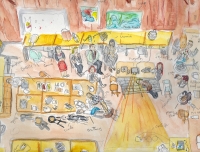 Art+Village+City in the Pearl River Delta is one of two interdisciplinary courses being sponsored by the Global Urban Humanities Initiative in Spring 2015. Students in this research studio are utilizing a variety of research methods from interviews to video documentation to explore the ongoing evolution of relationships between urban and rural spaces and people, and the emerging role of the arts in China’s Pearl River Delta. Students paired up to create videos of places related to China and the Chinese diaspora throughout the Bay Area. Here is José Figueroa's watercolor documentation of the in-class presentations! We'll be posting one of…
Art+Village+City in the Pearl River Delta is one of two interdisciplinary courses being sponsored by the Global Urban Humanities Initiative in Spring 2015. Students in this research studio are utilizing a variety of research methods from interviews to video documentation to explore the ongoing evolution of relationships between urban and rural spaces and people, and the emerging role of the arts in China’s Pearl River Delta. Students paired up to create videos of places related to China and the Chinese diaspora throughout the Bay Area. Here is José Figueroa's watercolor documentation of the in-class presentations! We'll be posting one of…
Opportunities to Create an Inclusive Sense of Place
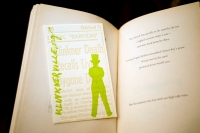 As part of the Global Urban Humanities Initiative Colloquium called Reading Cities, Sensing Cities we have asked students and visitors to write responses to each of the weekly guest lectures. November 6, 2014 The Art of Change: Exploring Neighborhoods in Transition Sue Mark (marksearch) and Anisha Gade (City and Regional Planning and Architecture) Presentation available here. Video of the conversation available here. Mark and Gade discussed their project, Communities’ Crossing, a creative placemaking effort along San Pablo Avenue. by Yasir Hameed During Sue Mark and Anisha Gade’s presentation, it was stated that it is not possible for planners to create…
As part of the Global Urban Humanities Initiative Colloquium called Reading Cities, Sensing Cities we have asked students and visitors to write responses to each of the weekly guest lectures. November 6, 2014 The Art of Change: Exploring Neighborhoods in Transition Sue Mark (marksearch) and Anisha Gade (City and Regional Planning and Architecture) Presentation available here. Video of the conversation available here. Mark and Gade discussed their project, Communities’ Crossing, a creative placemaking effort along San Pablo Avenue. by Yasir Hameed During Sue Mark and Anisha Gade’s presentation, it was stated that it is not possible for planners to create…
Exploring Neighborhood Boundaries and Transforming Community
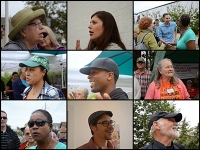 As part of the Global Urban Humanities Initiative Colloquium called Reading Cities, Sensing Cities we have asked students and visitors to write responses to each of the weekly guest lectures. November 6, 2014 The Art of Change: Exploring Neighborhoods in Transition Sue Mark (marksearch) and Anisha Gade (City and Regional Planning and Architecture) Presentation available here. Video of the conversation available here. Mark and Gade discussed their project, Communities’ Crossing, a creative placemaking effort along San Pablo Avenue. by Yuqing Nie Last week, artist Sue Mark and urban planner/design researcher Anisha Gade gave a talk on their latest creative place-making…
As part of the Global Urban Humanities Initiative Colloquium called Reading Cities, Sensing Cities we have asked students and visitors to write responses to each of the weekly guest lectures. November 6, 2014 The Art of Change: Exploring Neighborhoods in Transition Sue Mark (marksearch) and Anisha Gade (City and Regional Planning and Architecture) Presentation available here. Video of the conversation available here. Mark and Gade discussed their project, Communities’ Crossing, a creative placemaking effort along San Pablo Avenue. by Yuqing Nie Last week, artist Sue Mark and urban planner/design researcher Anisha Gade gave a talk on their latest creative place-making…
Living Archives: Filling Silences in History
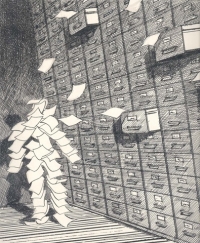 As part of the Global Urban Humanities Initiative Colloquium called Reading Cities, Sensing Cities we have asked students and visitors to write responses to each of the weekly guest lectures. November 6, 2014 The Art of Change: Exploring Neighborhoods in Transition Sue Mark (marksearch) and Anisha Gade (City and Regional Planning and Architecture) Presentation available here. Video of the conversation available here. Mark and Gade discussed their project, Communities’ Crossing, a creative placemaking effort along San Pablo Avenue. by Jaime Gómez The tons of documents hidden in Archives with a capital “A” around the world and managed by public and…
As part of the Global Urban Humanities Initiative Colloquium called Reading Cities, Sensing Cities we have asked students and visitors to write responses to each of the weekly guest lectures. November 6, 2014 The Art of Change: Exploring Neighborhoods in Transition Sue Mark (marksearch) and Anisha Gade (City and Regional Planning and Architecture) Presentation available here. Video of the conversation available here. Mark and Gade discussed their project, Communities’ Crossing, a creative placemaking effort along San Pablo Avenue. by Jaime Gómez The tons of documents hidden in Archives with a capital “A” around the world and managed by public and…
The Albany Bulb and Ephemeral Layers of Territory
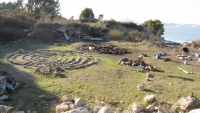 As part of the Global Urban Humanities Initiative Colloquium called Reading Cities, Sensing Cities we have asked students and visitors to write responses to each of the weekly guest lectures. October 30, 2014 Nature, Culture, and Conflict at a Shoreline Landfill: The Albany Bulb Susan Moffat (Global Urban Humanities Initiative) Moffat presented on The Atlas of the Albany Bulb, her oral history and mapping project about a landfill on the eastern shore of San Francisco Bay, which has been the location of bitter battles between people holding different notions of the proper uses of public space, and of what a…
As part of the Global Urban Humanities Initiative Colloquium called Reading Cities, Sensing Cities we have asked students and visitors to write responses to each of the weekly guest lectures. October 30, 2014 Nature, Culture, and Conflict at a Shoreline Landfill: The Albany Bulb Susan Moffat (Global Urban Humanities Initiative) Moffat presented on The Atlas of the Albany Bulb, her oral history and mapping project about a landfill on the eastern shore of San Francisco Bay, which has been the location of bitter battles between people holding different notions of the proper uses of public space, and of what a…
Bay Area Landscapes and the Conflict Over Open Space
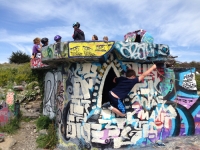 As part of the Global Urban Humanities Initiative Colloquium called Reading Cities, Sensing Cities we have asked students and visitors to write responses to each of the weekly guest lectures. October 30, 2014 Nature, Culture, and Conflict at a Shoreline Landfill: The Albany Bulb Susan Moffat (Global Urban Humanities Initiative) Moffat presented on The Atlas of the Albany Bulb, her oral history and mapping project about a landfill on the eastern shore of San Francisco Bay, which has been the location of bitter battles between people holding different notions of the proper uses of public space, and of what a…
As part of the Global Urban Humanities Initiative Colloquium called Reading Cities, Sensing Cities we have asked students and visitors to write responses to each of the weekly guest lectures. October 30, 2014 Nature, Culture, and Conflict at a Shoreline Landfill: The Albany Bulb Susan Moffat (Global Urban Humanities Initiative) Moffat presented on The Atlas of the Albany Bulb, her oral history and mapping project about a landfill on the eastern shore of San Francisco Bay, which has been the location of bitter battles between people holding different notions of the proper uses of public space, and of what a…
Redirecting the Relationship Between Tech and Innovation
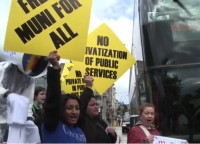 As part of the Global Urban Humanities Initiative Colloquium called Reading Cities, Sensing Cities we have asked students and visitors to write responses to each of the weekly guest lectures. October 16, 2014 Creative Class Civil Wars: Displacement and the Arts in the Bay Area Shannon Steen (Theater, Dance, and Performance Studies) Presentation available here. Video of the conversation available here. Steen presented research from her project “Creative Class Civil Wars,” which explores the ways our concepts of creativity are shifting to exclude those in the arts. by Robyn Perry "The notion that diversity in an early team is important…
As part of the Global Urban Humanities Initiative Colloquium called Reading Cities, Sensing Cities we have asked students and visitors to write responses to each of the weekly guest lectures. October 16, 2014 Creative Class Civil Wars: Displacement and the Arts in the Bay Area Shannon Steen (Theater, Dance, and Performance Studies) Presentation available here. Video of the conversation available here. Steen presented research from her project “Creative Class Civil Wars,” which explores the ways our concepts of creativity are shifting to exclude those in the arts. by Robyn Perry "The notion that diversity in an early team is important…
